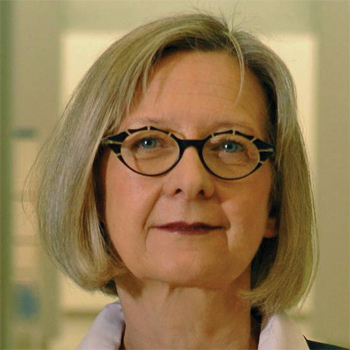Gronenborn honored for advances in NMR spectroscopy
, a professor at the University of Pittsburgh, has won the 2019 Mildred Cohn Award in Biological Chemistry from the ͵ĹÄ͵żú and ͵ĹÄ͵żú Biology for her work in nuclear magnetic resonance spectroscopy. This award recognizes scientists who have developed innovative physical approaches to advance the field of biological chemistry.

“I am deeply grateful and very pleased to have been nominated and selected for the 2019 Mildred Cohn Award from the ASBMB. Mildred Cohn was one of the first women in NMR and pioneered its use to study enzymatic reactions. She was daring and undeterred, overcoming countless obstacles during her long life. It’s an honor to receive this award named after such a tremendous scientist.”
— Angela Gronenborn
, a professor at the University of Delaware, nominated Gronenborn for the award, writing, “Professor Gronenborn’s pioneering contributions to the field of biological chemistry are remarkable in their vision, creativity and intellectual depth.”
Gronenborn chairs the department of structural biology at the University of Pittsburgh School of Medicine. Her research group combines NMR spectroscopy with biophysics, biochemistry and chemistry to investigate cellular processes at the molecular and atomic levels to understand human disease. Major focuses of her lab include protein-carbohydrate recognition, HIV pathogenesis and protein deposition diseases.
Gronenborn became interested in NMR spectroscopy during her graduate training at the University of Cologne. Throughout her career, she has transformed and expanded the applications of NMR spectroscopy to determine the structure of biological macromolecules. Her work includes nearly 500 peer-reviewed articles, including several landmark publications that opened the door for modern triple-resonance NMR experiments.
In 1988, Gronenborn joined the National Institutes of Health where, alongside Marius Clore and Adriaan Bax, she started to work on HIV, supported by the HIV-targeted antiviral program. She pushed the boundaries of NMR spectroscopy by developing new technologies to determine the structures of proteins and protein complexes larger than 20 kilodaltons, a feat the scientific community considered impossible at the time.
wrote in his letter of support for Gronenborn’s nomination, “Her work, both in quantity and depth, continues to define and extend the limit of macromolecular NMR.”
Gronenborn’s current work aims to understand how HIV hijacks the host cell machinery for replication by determining complexes of viral and cellular proteins. She combines computational tools from chemistry and physics with her expertise in NMR spectroscopy and X-ray crystallography to analyze HIV biology.
, a professor at the Massachusetts Institute of Technology, wrote in his letter supporting Gronenborn’s nomination, “Her research continues to push the technological boundaries for determination of structure and dynamics of large complexes of HIV assemblies with human proteins.”
In addition to her research achievements, Gronenborn has been honored for her devotion to the scientific community. She has trained more than 60 Ph.D. students, postdoctoral researchers and undergraduate students during her academic career. She also has chaired multiple international scientific conferences, and she serves in editorial roles for a number of journals. In 2007, Gronenborn was elected to the National Academy of Sciences for her outstanding contributions to research.
Gronenborn will receive her award at the ASBMB annual meeting during the Experimental Biology 2019 conference in Orlando, where she will deliver an award lecture on “The awesome power of Fluorine NMR” at 9 a.m. April 17 in Valencia Ballroom A at the Orange County Convention Center.
(This article was corrected April 9, 2019 to clarify information in the fifth paragraph about Gronenborn's work at the NIH.)
Enjoy reading ASBMB Today?
Become a member to receive the print edition four times a year and the digital edition weekly.
Learn moreGet the latest from ASBMB Today
Enter your email address, and we’ll send you a weekly email with recent articles, interviews and more.
Latest in People
People highlights or most popular articles

Guiding grocery carts to shape healthy habits
Robert “Nate” Helsley will receive the Walter A. Shaw Young Investigator in Lipid Research Award at the 2025 ASBMB Annual Meeting, April 12–15 in Chicago.

Leading the charge for gender equity
Nicole Woitowich will receive the ASBMB Emerging Leadership Award at the 2025 ASBMB Annual meeting, April 12–15 in Chicago.

Honors for de la Fuente, Mittag and De La Cruz
César de la Fuente receives the American Society of Microbiology’s Award for Early Career Basic Research. Tanja Mittag and Enrique M. De La Cruz are named fellows by the Biophysical Society.

In memoriam: Horst Schulz
He was a professor emeritus at City College of New York and at the CUNY Graduate Center in Manhattan whose work concentrated on increasing our understanding of mitochondrial fatty acid metabolism and an ASBMB member since 1971.

Computational and biophysical approaches to disordered proteins
Rohit Pappu will receive the 2025 DeLano Award for Computational Biosciences at the ASBMB Annual Meeting, April 12-15 in Chicago.

Join the pioneers of ferroptosis at cell death conference
Meet Brent Stockwell, Xuejun Jiang and Jin Ye — the co-chairs of the ASBMB’s 2025 meeting on metabolic cross talk and biochemical homeostasis research.

